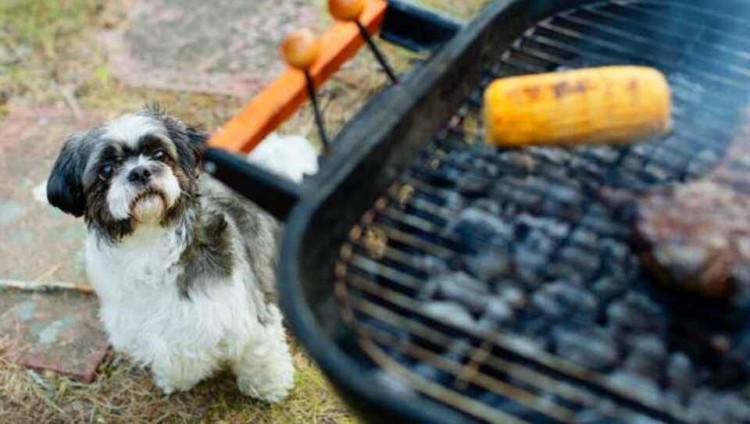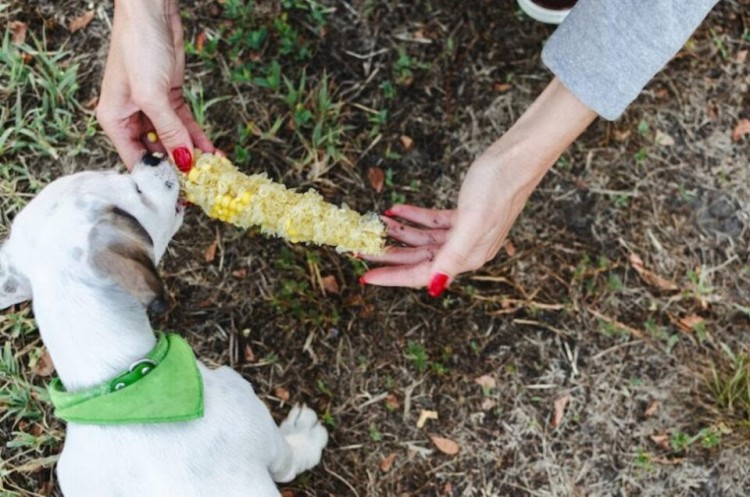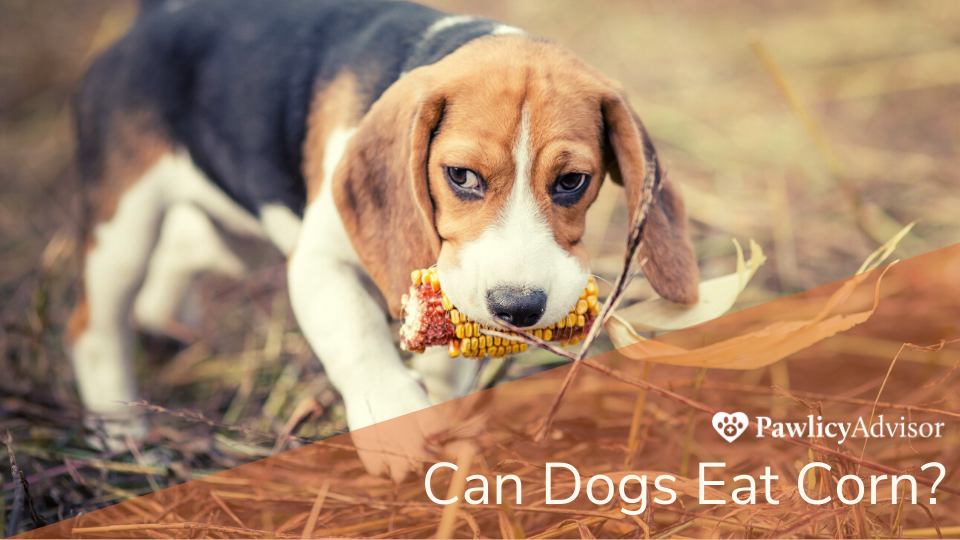Corn is a common food that humans consume, but can dogs eat corn? Yes, corn is perfectly safe for dogs. In fact, because it is one of the most inexpensive cereal grains, corn can be found in many dog foods. However, there are some things you need to take into consideration, such as what form of corn you give to your pooch and in what amount.
Let’s take a closer look at the overall pros and cons of feeding your canine companion corn and corn products.
Pro tip: If you suspect your dog has swallowed something they shouldn’t, such as corn cob, be sure to contact your vet right away. GI obstruction procedures are expensive and sometimes reach up to $3,000! Signing up for pet insurance can protect you and your four-legged friend should an accident like this happen.
Table of Content
- Benefits of corn for dogs
- Is corn bad for dogs?
- Can dogs eat corn cobs?
- Can dogs eat corn kernels?
- Can dogs eat popcorn?
- Can dogs eat sweet corn?
- Can dogs eat canned corn?
- Can dogs eat cornflour?
- Key Takeaways
Benefits of corn for dogs
Corn is not toxic to dogs and a small quantity won’t harm your pooch. Studies have shown that corn is easily digestible and is usually the second choice behind rice for foods designed for canines.
Corn is one of the most widely-used grains in the world and, depending on the type, it might be a good source of the following nutrients:
- Easily digestible carbs, which serve as an energy source for your furry friend.
- Protein and amino acids, which are vital for maintaining healthy skin, hair, and muscles.
- Antioxidants like beta-carotene and vitamin E, which help support the immune system.
- Linoleic acid, an omega-6 fatty acid that canines can’t produce on their own. It is crucial for helping your pooch grow and maintain a healthy immune system, coat, and skin.
- Dietary fiber, which promotes gut health and motility.
 (Image source: The Spruce Pets)
(Image source: The Spruce Pets)
Is corn bad for dogs?
In general, corn is safe for pups and can be part of a well-balanced diet. However, it should only be served in moderate quantities. Generally speaking, treats should not make up more than 10% of your pup’s diet and too much human food might make your pet’s diet inadequate to their nutritional needs or contribute to weight gain.
Although very rare, some pups suffer from corn allergies as a result of an overactive immune system to the product. Symptoms of corn allergy in dogs include:
- Diarrhea
- Vomiting
- Itching
- Skin irritation
- Abdominal cramping
- Hives
- Obsessive licking
- Biting of the paws
If your pet is exhibiting any of these symptoms, be sure to make an appointment with your vet. There’s a number of conditions that might cause similar clinical signs as a food allergy, so the vet will need to run some tests to rule out any illnesses.
If the vet suspects a food allergy, they will provide you with instructions on how to determine which specific food item is causing your pet distress. They might also suggest an elimination diet, which you’ll need to follow very closely.
If your dog is allergic to corn, you’ll need to do research on dog foods that don’t contain corn and corn products. It is much more common for your pet to be allergic to the protein source in their food than to the other components like corn or rice.
Can dogs eat corn cobs?
Many pups like to chew on corn cobs but unfortunately, they might swallow a big piece of cob, which can be a choking hazard or cause gastrointestinal obstruction or injury. Corn cobs don’t completely break down in a pup's stomach and their size is often too big to pass through the GI tract. The risk of GI obstruction is highest in smaller and medium-sized breeds, although big canines can be affected as well.
Most pups with gastrointestinal injury or obstruction will show the following symptoms:
- Vomiting
- Diarrhea
- Lethargy
- Heaving
- Abdominal discomfort
- Loss of appetite
- Tarry stool
- Constipation
If you suspect your canine companion has eaten a corn cob, call your vet. The signs of a gastrointestinal obstruction can be similar to the signs of other health conditions. If your pooch starts showing symptoms of illness, take them to the nearest vet office immediately.
Pro tip: GI obstruction is an emergency situation and the cost of surgery is expensive. The good news is most pet insurance companies will pay for treatment and surgery. You can get insurance quotes and sign up quickly online.
Do not try to induce vomiting in your furry pal unless you’ve been advised to do so by your vet. Inducing vomiting can cause further damage to your pet’s esophagus and stomach.
So, how can you make sure your dog doesn’t get their teeth on corn cobs? Some pups won’t hesitate to go through the trash looking for tasty treats. For that reason, you should avoid leaving corn cobs in a trash can that your pet has access to. Instead, dispose of them in the outside trash can that’s out of their reach.
 (Image source: Dogster)
(Image source: Dogster)
Can dogs eat corn kernels?
Corn kernels are small, which means there’s no risk of choking and your dog can safely consume them. Be sure that the kernels are served plain, without any butter, salt, mayonnaise, or other fatty flavor enhancers. A bit of fat is fine, but too much fat and salt can lead to stomach issues and obesity.
Can dogs eat popcorn?
Popcorn can be a fun and tasty treat for your four-legged companion, as long as you serve it unbuttered and unsalted. Plain popcorn is rich in dietary fiber, as well as carbs which give extra energy. Avoid serving flavored and pre-packed popcorn, which contain lots of artificial flavors, oils, and sodium.
When making the popcorn yourself, remove all the kernels that don’t completely pop as these can cause stomach upset in your dog. You should also be aware that popcorn that gets stuck between your pup’s teeth might cause gum disease or teeth decay.
Can dogs eat sweet corn?
Sweet corn is picked at a more immature stage than regular corn and has high sugar content. In addition, this type of corn is quite starchy and difficult to digest. That being said, sweet corn is not dangerous provided it is given in small amounts and as an occasional treat.
Can dogs eat canned corn?
Canned corn consists of kernels taken off the corn cob, so it's safe for canine consumption. Just remember not to give your pooch too much of it.
Can dogs eat cornflour?
Cornflour is used as a thickener in some dog foods, so you can safely add it to your dog’s meals. Cornflour doesn’t add much in nutritional value but can be useful if your pet eats only gluten-free meals or if you want to prepare your own treats.
Key Takeaways
- Pups can safely indulge in corn once in a while. However, you need to be very careful when it comes to corn cobs as they can cause serious GI obstruction.
- To stay on the safe side, let your pet have only the kernels. You should also avoid toppings like butter and salt.
- Ultimately, it is important to ensure that your pet has all the nutrition they need. Give corn as an occasional treat and make sure your canine companion doesn’t eat too much.
- As with any new foods you introduce to your dog’s diet, consult with your vet to make sure it’s safe for them to consume.
